It looks like you're using an Ad Blocker.
Please white-list or disable AboveTopSecret.com in your ad-blocking tool.
Thank you.
Some features of ATS will be disabled while you continue to use an ad-blocker.
share:
3,200-Year-Old Stone Inscription Tells of Trojan Prince, Sea
People (livescience.com)
A copy of the inscription is from the collection of James Mellaart (who discovered the site of Çatalhöyük), the original inscription was lost long ago, with only a copy made before it was destroyed. At the time of it's discovery, no one could read the Luwian language it was written in. The inscription covers a unique tale of the Trojan and neighboring cities as well as chaotic influence of the Sea Peoples.
A 3,200-year-old stone slab with an inscription that tells of a Trojan prince and may refer to the mysterious Sea People has been deciphered, archaeologists announced today (Oct. 7).
The stone inscription, which was 95 feet (29 meters) long, describes the rise of a powerful kingdom called Mira, which launched a military campaign led by a prince named Muksus from Troy.
The inscription is written in an ancient language called Luwian that just a few scholars, no more than 20 by some estimates, can read today. Those scholars include Fred Woudhuizen, an independent scholar, who has now deciphered a copy of the inscription.
A copy of the inscription is from the collection of James Mellaart (who discovered the site of Çatalhöyük), the original inscription was lost long ago, with only a copy made before it was destroyed. At the time of it's discovery, no one could read the Luwian language it was written in. The inscription covers a unique tale of the Trojan and neighboring cities as well as chaotic influence of the Sea Peoples.
originally posted by: Blackmarketeer
3,200-Year-Old Stone Inscription Tells of Trojan Prince, Sea People (livescience.com)
A 3,200-year-old stone slab with an inscription that tells of a Trojan prince and may refer to the mysterious Sea People has been deciphered, archaeologists announced today (Oct. 7).
The stone inscription, which was 95 feet (29 meters) long, describes the rise of a powerful kingdom called Mira, which launched a military campaign led by a prince named Muksus from Troy.
The inscription is written in an ancient language called Luwian that just a few scholars, no more than 20 by some estimates, can read today. Those scholars include Fred Woudhuizen, an independent scholar, who has now deciphered a copy of the inscription.
A copy of the inscription is from the collection of James Mellaart (who discovered the site of Çatalhöyük), the original inscription was lost long ago, with only a copy made before it was destroyed. At the time of it's discovery, no one could read the Luwian language it was written in. The inscription covers a unique tale of the Trojan and neighboring cities as well as chaotic influence of the Sea Peoples.
To people of Troy, Minoans would be people who come from the sea since their civilization was on an island and likely had to trade with everyone at the shores to get all the stuff for their markets.
a reply to: Blackmarketeer
Thats a very interesting find and I highly doubt anyone would go through all that time and trouble to create a forgery.
Not ever hearing about the "Sea People", I Google it and found this. Leaving a description here for others who are clueless as to who these people were.
Thats a very interesting find and I highly doubt anyone would go through all that time and trouble to create a forgery.
Not ever hearing about the "Sea People", I Google it and found this. Leaving a description here for others who are clueless as to who these people were.
www.ancient.eu...
The Sea Peoples were a confederacy of naval raiders who harried the coastal towns and cities of the Mediterranean region between c. 1276-1178 BCE, concentrating their efforts especially on Egypt. The nationality of the Sea Peoples remains a mystery as the existing records of their activities are mainly Egyptian sources who only describe them in terms of battle such as the record from the Stele at Tanis which reads, in part, “They came from the sea in their war ships and none could stand against them." This description is typical of Egyptian references to these mysterious invaders.
a reply to: MamaJ
Very interesting. Jordan Maxwell talks about the ancient cannonite god Dagon who was the fish god. This is where the pope gets his fish hat from supposedly.
Very interesting. Jordan Maxwell talks about the ancient cannonite god Dagon who was the fish god. This is where the pope gets his fish hat from supposedly.
edit on 8-10-2017 by booyakasha because: (no reason given)
edit on 8-10-2017 by booyakasha because:
(no reason given)
I've often thought that this topic is one that deserves an airing on ATS, but wasn't sure there was an audience for it.
FWIW, now that it's been raised, the anonymous "Sea People" are just one aspect of a greater puzzle, known as the Late Bronze Age Collapse. You can guess what that means just by the title alone. All the early European civilisations around the Mediterranean Sea suddenly upped and vanished.
No-one knows why, although over the last few centuries there have been plenty of theories. Some of these theories actually suggest the Sea People themselves were responsible - but if that were the case, what caused the Sea People to disappear too?
The Mediterranean civilisations reappeared later, obviously, but what happened in between is an absolute blank. Even during the Black Death, which wiped out an estimated 40 per cent of Europe in the middle ages, civilisation kept going and left evidence behind. Whatever caused the Late Bronze Age Collapse was more serious than the Black Death!
FWIW, now that it's been raised, the anonymous "Sea People" are just one aspect of a greater puzzle, known as the Late Bronze Age Collapse. You can guess what that means just by the title alone. All the early European civilisations around the Mediterranean Sea suddenly upped and vanished.
No-one knows why, although over the last few centuries there have been plenty of theories. Some of these theories actually suggest the Sea People themselves were responsible - but if that were the case, what caused the Sea People to disappear too?
The Mediterranean civilisations reappeared later, obviously, but what happened in between is an absolute blank. Even during the Black Death, which wiped out an estimated 40 per cent of Europe in the middle ages, civilisation kept going and left evidence behind. Whatever caused the Late Bronze Age Collapse was more serious than the Black Death!
a reply to: audubon
The Sea Peoples are thought to be responsible for the collapse or the Hittite empire, driving them to a mountain holdout. Curiously, the Sea Peoples skipped over Phoenician settlements in the Anatolia area focusing on Hittites, or maybe not so curious if they had an alliance.
The Sea Peoples are thought to be responsible for the collapse or the Hittite empire, driving them to a mountain holdout. Curiously, the Sea Peoples skipped over Phoenician settlements in the Anatolia area focusing on Hittites, or maybe not so curious if they had an alliance.
a reply to: audubon
There is evidence in Egpyt that tell of large swathes of savages and refugees from the Med. sea, they were defeated twice, and never really came back. But a lot of them stayed and integrated into the Egyptian culture and lands. It is sort of like what is happening now, with Europe, but it's a lot less aggressive.
I think what it goes to show is that the sea peoples weren't any specific group, but a number of different cultures and what not just traveling around looking for a new more sustainable place to settle.
It was in a recorded lecture that I first heard of this. I will try and dig it up.
But, here is a reddit thread that can explain in a little detail, it has sources in it.
Also, it's been said that due to disease, famine, and natural disasters caused the sea peoples to group, and then take down Troy, which lead to the downward spiral of the Med. nations, it was like a world war at the time, and the Egyptians put an end to it.
There is evidence in Egpyt that tell of large swathes of savages and refugees from the Med. sea, they were defeated twice, and never really came back. But a lot of them stayed and integrated into the Egyptian culture and lands. It is sort of like what is happening now, with Europe, but it's a lot less aggressive.
I think what it goes to show is that the sea peoples weren't any specific group, but a number of different cultures and what not just traveling around looking for a new more sustainable place to settle.
It was in a recorded lecture that I first heard of this. I will try and dig it up.
But, here is a reddit thread that can explain in a little detail, it has sources in it.
Also, it's been said that due to disease, famine, and natural disasters caused the sea peoples to group, and then take down Troy, which lead to the downward spiral of the Med. nations, it was like a world war at the time, and the Egyptians put an end to it.
a reply to: Blackmarketeer
There may have been a few things in play at that time and place in history that contributed to the story told today . This vid offers multipal studies that might give the important context needed to paint a picture for us
There may have been a few things in play at that time and place in history that contributed to the story told today . This vid offers multipal studies that might give the important context needed to paint a picture for us
this is part of the inscription on Ramesses III’s mortuary temple at Medinet Habu
the destruction of Atlantis as told by Plato could have been caused by the sea peoples
perhaps they were the original deep state
The foreign countries made a conspiracy in their islands. All at once the lands were removed and scattered in the fray. No land could stand before their arms
the destruction of Atlantis as told by Plato could have been caused by the sea peoples
perhaps they were the original deep state
originally posted by: strongfp
I think what it goes to show is that the sea peoples weren't any specific group, but a number of different cultures and what not just traveling around looking for a new more sustainable place to settle.
I've heard that proposition before, and it just doesn't work for me (YMMV). The Sea People (going from memory here) never settled anywhere, they arrived out of the blue, destroyed everything, and then buggered off into obscurity again. They seem more like suntanned Vikings than anything else.
And that's the other thing: the Sea People clearly had a pretty advanced society already, capable of building troop-transporting ships, and training soldiers (not to mention arming them). I find it hard to believe that several organised warlike nations decided that it was more worthwhile teaming up to plunder lesser nations than plundering each other, unless they were just doing it for practice!
And again, a sort of Mediterranean "Axis of Evil" would have left the Axis nations intact after the others had been destroyed - and it would be reasonable to expect a few epic poems or monuments celebrating their own triumphs. But there aren't any such things, anywhere. It's a whodunnit with millions of corpses but no tell-tale fingerprints.
All that said, I'll be interested to see what comes out of this latest discovery - perhaps it will clear everything up nicely with no bits left over. (But I bet it doesn't!)
a reply to: audubon
The sea peoples went after the most powerful and largest nation in the area which is where Troy was. Troy and it's surrounding areas were already spread thin because it got so large, then the final nail in the coffin was these sea peoples.
And after that, they traveled mostly by land, sweeping down into Egypt, only some of them took on the head of the Nile. This is where the two battles come from, and the Egyptians defeated them both.
Watch the video posted here, it will go into much more detail.
The sea peoples went after the most powerful and largest nation in the area which is where Troy was. Troy and it's surrounding areas were already spread thin because it got so large, then the final nail in the coffin was these sea peoples.
And after that, they traveled mostly by land, sweeping down into Egypt, only some of them took on the head of the Nile. This is where the two battles come from, and the Egyptians defeated them both.
Watch the video posted here, it will go into much more detail.
a reply to: strongfp
Yeah, that's the same academic I linked to in my first post (a printed interview, rather than your video). I don't think the thesis that the Sea People attacked Troy has very much support. In fact, if I recall correctly, there are contemporary Egyptian records claiming that the Trojans were one of the Sea Peoples!
Cline seems to be of the opinion that the Sea People(s) came from the Western Mediterranean and gradually rolled eastward, eventually reaching Egypt. Thus cuts against nearly everyone else who has ever tried to reconstruct that period, among whom the consensus is that the Sea People's campaign started in the Eastern Mediterranean and perhaps even as far north as the Black Sea.
Given that the looting and sacking along Cline's supposed route would make this a supply-line strategy of dimensions that make Operation Market Garden seem like an egg-and-spoon race, I wonder how feasible this is. Of course, I haven't read Cline's book, so I might be talking cack.
And of course there are historians who reckon the Sea People never existed at all. So you pays your money and picks your expert.
Yeah, that's the same academic I linked to in my first post (a printed interview, rather than your video). I don't think the thesis that the Sea People attacked Troy has very much support. In fact, if I recall correctly, there are contemporary Egyptian records claiming that the Trojans were one of the Sea Peoples!
Cline seems to be of the opinion that the Sea People(s) came from the Western Mediterranean and gradually rolled eastward, eventually reaching Egypt. Thus cuts against nearly everyone else who has ever tried to reconstruct that period, among whom the consensus is that the Sea People's campaign started in the Eastern Mediterranean and perhaps even as far north as the Black Sea.
Given that the looting and sacking along Cline's supposed route would make this a supply-line strategy of dimensions that make Operation Market Garden seem like an egg-and-spoon race, I wonder how feasible this is. Of course, I haven't read Cline's book, so I might be talking cack.
And of course there are historians who reckon the Sea People never existed at all. So you pays your money and picks your expert.
a reply to: Blackmarketeer
That is fantastic Blackmarketeer, S & F.
People dont forget, these events did not happen in a vacuum, there is several thousand years of history and relationships between these people.
The " Sea People" were many different people, but they had one thing in common, they were used as mercenaries by the Minoans.
As Minoan influence and trade interests expanded, they hired locals to be their muscle, the Myceneans being the top. Sardnians, Tuscans, Ilyrians, Cypriots, Sicilians and various other "greek" tribes were all employed by the Minoans to protect shipping and enforce their trade policies.
When the Minoan system collapsed with the Theran erputions, the Mycenaens filled the power void, and employed the same peoples, but they had free reign to do as they wanted.
It was during Mycenaen rule of Crete that it reached its economic zenith, but all the while the whole region was in chaos. Many of the previously mentioned peoples also have a presence on Crete during this period.
It has been proposed that crete became somewhat of a pirate haven, and you could use the ports as long as the king got his cut.
The sea people , sardinians in particular, were hired by the egyptians as soldiers, one pharao used sardinians as his personal bodyguard.
The peleset(phillistines) were greeks living in the levant and after a few centuries of building a hybrid culture with the local levantines, they invaded egypt and were known as the Hyksos.
Other agean greek influenced citys came to become known as the phonecians, that is whey those cities were spared in sea people invasions, they were loosley related cousins.
That is fantastic Blackmarketeer, S & F.
People dont forget, these events did not happen in a vacuum, there is several thousand years of history and relationships between these people.
The " Sea People" were many different people, but they had one thing in common, they were used as mercenaries by the Minoans.
As Minoan influence and trade interests expanded, they hired locals to be their muscle, the Myceneans being the top. Sardnians, Tuscans, Ilyrians, Cypriots, Sicilians and various other "greek" tribes were all employed by the Minoans to protect shipping and enforce their trade policies.
When the Minoan system collapsed with the Theran erputions, the Mycenaens filled the power void, and employed the same peoples, but they had free reign to do as they wanted.
It was during Mycenaen rule of Crete that it reached its economic zenith, but all the while the whole region was in chaos. Many of the previously mentioned peoples also have a presence on Crete during this period.
It has been proposed that crete became somewhat of a pirate haven, and you could use the ports as long as the king got his cut.
The sea people , sardinians in particular, were hired by the egyptians as soldiers, one pharao used sardinians as his personal bodyguard.
The peleset(phillistines) were greeks living in the levant and after a few centuries of building a hybrid culture with the local levantines, they invaded egypt and were known as the Hyksos.
Other agean greek influenced citys came to become known as the phonecians, that is whey those cities were spared in sea people invasions, they were loosley related cousins.
I couldnt help but instantly think of this....


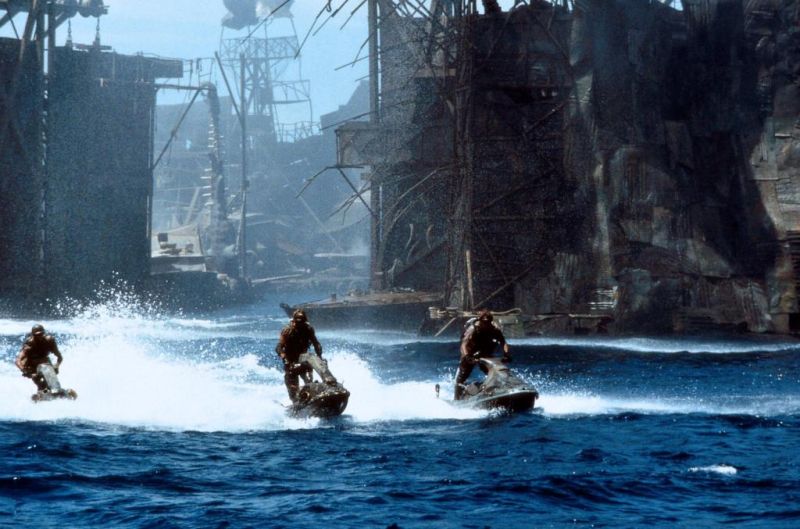
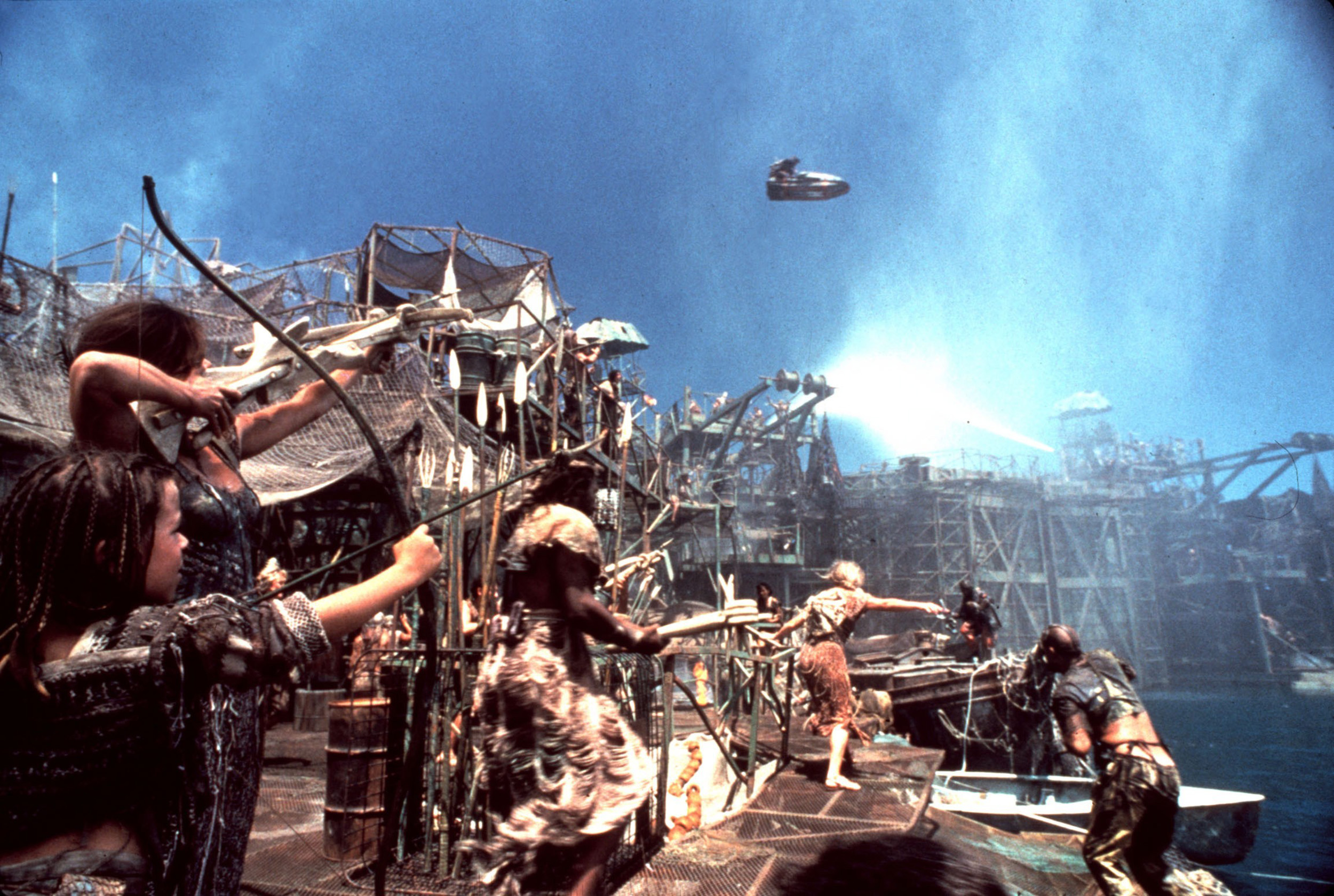
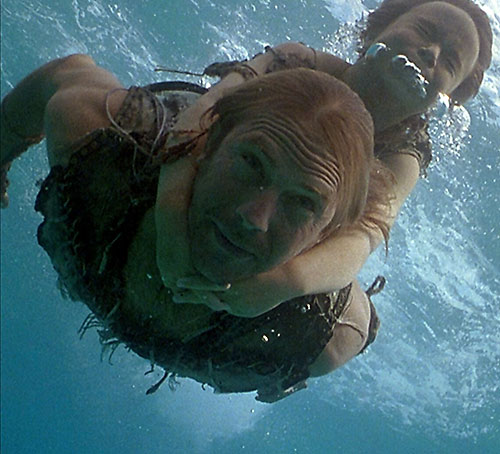
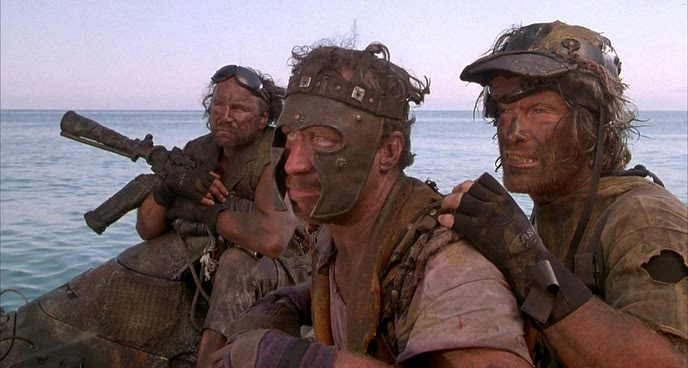
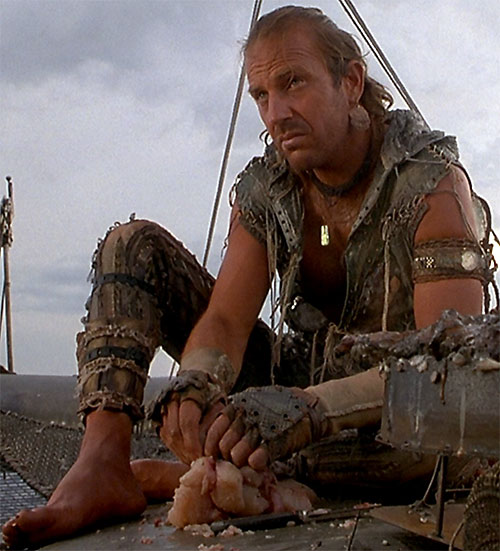

*Sigh*
They just don't make em like they used to....
Cool thread!








*Sigh*
They just don't make em like they used to....
Cool thread!
a reply to: audubon
Coupled with Santorini Island volcano explosion, that could have caused a large Tsunami, maybe...
FWIW, now that it's been raised, the anonymous "Sea People" are just one aspect of a greater puzzle, known as the Late Bronze Age Collapse. You can guess what that means just by the title alone. All the early European civilisations around the Mediterranean Sea suddenly upped and vanished.
Coupled with Santorini Island volcano explosion, that could have caused a large Tsunami, maybe...
a reply to: Blackmarketeer
These sea people sound like a ragtag band of pirates. One has to wonder if they are somehow survivors or refugees from Atlantis or some other islands chain of nation-states that the ancient Greeks battled against back then hence the rather cryptic reference “They came from the sea in their warships and none could stand against them.".
These sea people sound like a ragtag band of pirates. One has to wonder if they are somehow survivors or refugees from Atlantis or some other islands chain of nation-states that the ancient Greeks battled against back then hence the rather cryptic reference “They came from the sea in their warships and none could stand against them.".
originally posted by: booyakasha
a reply to: MamaJ
Very interesting. Jordan Maxwell talks about the ancient cannonite god Dagon who was the fish god. This is where the pope gets his fish hat from supposedly.
Probably not a fish god:
The name is recorded as Ugaritic Dgn (Dagnu or Daganu), Akkadian: Dagana.
In Ugaritic, the root dgn also means grain: in Hebrew דגן dāgān, Samaritan dīgan, is an archaic word for grain. The Phoenician author Sanchuniathon (according to Philo of Byblus) explained Dagon as a word for "grain" (siton). Sanchuniathon further explains: "And Dagon, after he discovered grain and the plough, was called Zeus Arotrios." The word arotrios means "ploughman", "pertaining to agriculture" (confer ἄροτρον "plow").
The theory relating the name to Hebrew dāg/dâg, 'fish', based solely upon a reading of 1 Samuel 5:2–7...
Wiki
The first to cast doubt on the "fish" etymology was Schmökel (1928), who suggested that while Dagon was not in origin a "fish god", the association with dâg "fish" among the maritime Canaanites (Phoenicians) would have affected the god's iconography.[9] Fontenrose (1957:278) still suggests that Berossos' Odakon, part man and part fish, was possibly a garbled version of Dagon. Dagon was also equated with Babylonian Oannes.
Same source
However, the papal Tiara may well derive from the early depictions of the Apkallu. The "Dagon" photo was misidentified by Austen Henry Layard who discovered that particular depiction in the 1800's - it is an Assyrian Apkallu - I forget what they called them, Apkallu is a Babylonian word for Abgal (Sumerian.) The Abgal were representatives of An, the top god of the Sumerians, that were sent to humans to civilize them. The Abgal were often depicted as wearing the body of a fish. The first Abgal was a human being - Adapa (aka Oannes) that was converted to an Abgal by the gods.
The Abgal themselves were not part of the pantheon of gods, just their representatives.
The Pope's role is seen as similar - a representative of God.
Harte
new topics
-
President BIDEN's FBI Raided Donald Trump's Florida Home for OBAMA-NORTH KOREA Documents.
Political Conspiracies: 4 hours ago -
Maestro Benedetto
Literature: 6 hours ago -
Is AI Better Than the Hollywood Elite?
Movies: 6 hours ago -
Las Vegas UFO Spotting Teen Traumatized by Demon Creature in Backyard
Aliens and UFOs: 9 hours ago -
2024 Pigeon Forge Rod Run - On the Strip (Video made for you)
Automotive Discussion: 10 hours ago -
Gaza Terrorists Attack US Humanitarian Pier During Construction
Middle East Issues: 10 hours ago -
The functionality of boldening and italics is clunky and no post char limit warning?
ATS Freshman's Forum: 11 hours ago
top topics
-
President BIDEN's FBI Raided Donald Trump's Florida Home for OBAMA-NORTH KOREA Documents.
Political Conspiracies: 4 hours ago, 26 flags -
Krystalnacht on today's most elite Universities?
Social Issues and Civil Unrest: 15 hours ago, 9 flags -
Supreme Court Oral Arguments 4.25.2024 - Are PRESIDENTS IMMUNE From Later Being Prosecuted.
Above Politics: 15 hours ago, 8 flags -
Weinstein's conviction overturned
Mainstream News: 14 hours ago, 8 flags -
Gaza Terrorists Attack US Humanitarian Pier During Construction
Middle East Issues: 10 hours ago, 8 flags -
Massachusetts Drag Queen Leads Young Kids in Free Palestine Chant
Social Issues and Civil Unrest: 12 hours ago, 7 flags -
Las Vegas UFO Spotting Teen Traumatized by Demon Creature in Backyard
Aliens and UFOs: 9 hours ago, 6 flags -
Meadows, Giuliani Among 11 Indicted in Arizona in Latest 2020 Election Subversion Case
Mainstream News: 12 hours ago, 5 flags -
2024 Pigeon Forge Rod Run - On the Strip (Video made for you)
Automotive Discussion: 10 hours ago, 4 flags -
Is AI Better Than the Hollywood Elite?
Movies: 6 hours ago, 3 flags
active topics
-
Supreme Court Oral Arguments 4.25.2024 - Are PRESIDENTS IMMUNE From Later Being Prosecuted.
Above Politics • 90 • : Lumenari -
Las Vegas UFO Spotting Teen Traumatized by Demon Creature in Backyard
Aliens and UFOs • 12 • : KrustyKrab -
Gaza Terrorists Attack US Humanitarian Pier During Construction
Middle East Issues • 28 • : firerescue -
SHORT STORY WRITERS CONTEST -- April 2024 -- TIME -- TIME2024
Short Stories • 23 • : DontTreadOnMe -
President BIDEN's FBI Raided Donald Trump's Florida Home for OBAMA-NORTH KOREA Documents.
Political Conspiracies • 16 • : Astyanax -
Truth Social goes public, be careful not to lose your money
Mainstream News • 130 • : Astyanax -
Is AI Better Than the Hollywood Elite?
Movies • 13 • : Justoneman -
Hate makes for strange bedfellows
US Political Madness • 47 • : 19Bones79 -
-@TH3WH17ERABB17- -Q- ---TIME TO SHOW THE WORLD--- -Part- --44--
Dissecting Disinformation • 689 • : daskakik -
University of Texas Instantly Shuts Down Anti Israel Protests
Education and Media • 265 • : Astrocometus
